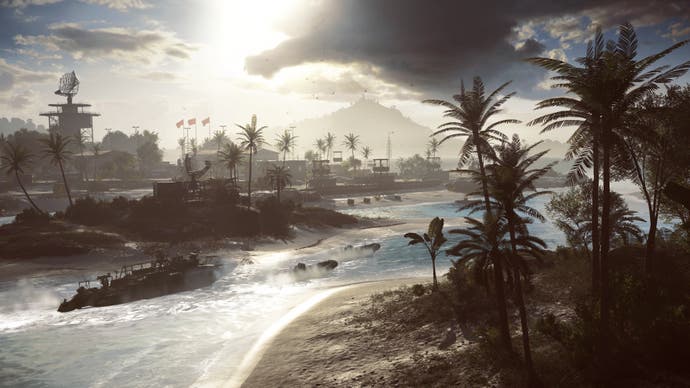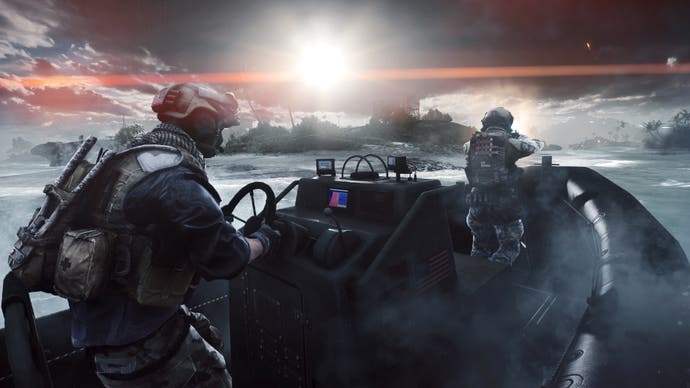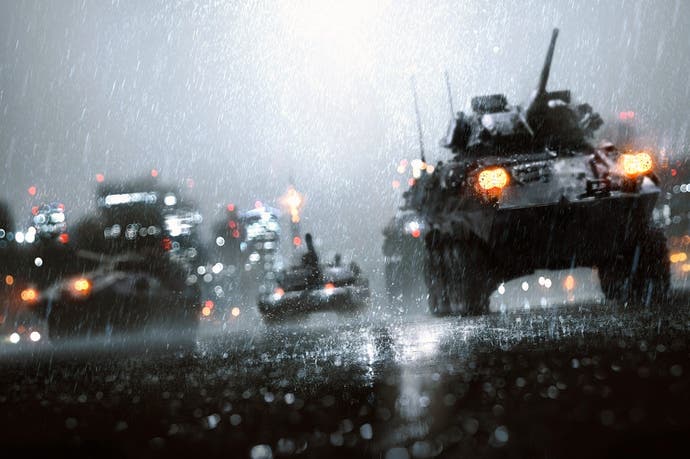Battlefield 4: disaster report
Charting the collateral damage of EA and DICE's catastrophic launch.
29th October 2013
A day that should have been one of pride for all at Electronic Arts and DICE, but one that has to surely go down in infamy. The day Battlefield 4 hit shelves, and set in motion a series of events that has shaken the company and its prized development studio, and punctured waning public faith.
8th November 2013
The PS4 version of the game hits shelves, with the Xbox One edition arriving a week later. Anger fuels message boards as Sony's console achieves a significantly higher resolution for Battlefield 4 (and Call of Duty: Ghosts) than Microsoft's, distracting many from the real issue; that the game barely works. In my own first few days with Battlefield 4 on PS4, I had my campaign save corrupted (no great shame), my online stats reset three times, was regularly unable to join matches, was not able to join friends and when I did finally manage to find a game, was unceremoniously booted back to the dashboard on almost every occasion. I was not alone.
Battlefield 4 has been a disaster. That is not hyperbole. It's one of the highest-profile games to have ever collapsed under its own weight, and one of the most significant mishaps in EA's history.

Let's not underestimate the scale. Battlefield 4 is huge. When something this colossal collapses in on itself and millions and millions of people, it's not just that they can't play the game - they're actively attacked by it as it corrupts save files or deletes their progress (and time, a far more precious commodity than both cash or XP). That's the kind of nightmare that probably could have justified a product recall. It's that bad.
And, of course, it has had serious repercussions for EA. First of all, it must be said that in the daunting face of the apocalypse, the publishing giant has handled itself about as well as it could have; all positive statements of intent, complete ownership of guilt, regular communication and, eventually, the big daddy. The shutdown...
4th December 2013
On the eve of the release of the China Rising DLC pack, EA releases the following statement: "First, we want to thank the fans out there that are playing and supporting us with Battlefield 4. We know we still have a ways to go with fixing the game - it is absolutely our number one priority. The team at DICE is working non-stop to update the game. Since Battlefield 4 China Rising expansion pack was already in the final stages of development by the time issues began with Battlefield 4, we decided to fulfil our promise to deliver it this week, but we're not moving onto future projects or expansions until we sort out all the issues with Battlefield 4. We know many of our players are frustrated, and we feel their pain. We will not stop until this is right."
A solid and necessary piece of PR; the type of thing you'd hope to hear a football manager say after his team goes on a three-game losing streak. That one crucial line, though, "we're not moving onto future projects or expansions until we sort out all the issues with Battlefield 4", marks a significant structural shift within EA. This isn't just a situation where a couple of map packs are delayed. If DICE has downed tools on every single project in order to rectify its own catastrophe, then how does that affect the day-to-day business of an almightily powerful team?

Even forgetting Mirror's Edge 2 and Star Wars Battlefront for a moment - notable names and damaging pushbacks if they're needed, but also two games without release dates or concrete expectations - DICE is responsible for the upkeep of Frostbite 3, the engine that's powering everything in Electronic Arts' action wheelhouse and the very foundations of its business plan. And what of the next Battlefield? Does this eat into its already tight development schedule? Of course, it hasn't been announced yet, but with Medal of Honor dead and Battlefield EA's sole contemporary shooter, it's a sure thing - and it could reasonably be expected later this year. It's already in trouble if part of the team behind it is losing precious milestone minutes rectifying the mistakes of others.
It's such a maddening situation that attributing culpability is almost reductive. Who's to blame? Individuals, collectives - a thousand wrong decisions layering upon themselves, hiding in the sand hoping the world will go away. The reasons are obvious - new engine, new consoles, too many SKUs, too short a development cycle - but they're not excuses. If anything, Battlefield 4 is less of a damning of EA as a company (a tedious and misplaced source of ire, really - they're not your friends, but nor are Nintendo or Sega), and more of an embarrassment. When the publisher's other big boy, FIFA, manages a cross-gen release in a single year and the only real problems it has are a few too many goals from corners, it must be a touch frustrating to see the other guys letting the side down. Think of this as less of a damning of EA, and more a question of just what the hell does it need to do next?
Perhaps the strangest thing of all is that we've actually now become totally accustomed to paying for and playing busted, incomplete or simply non-existent games. It's become a part of the culture. Look at the alpha and beta reviews driving traffic most days on this very website. The rampant success of DayZ. The absurdly lucrative Star Citizen, a game that only exists in a trust-based limbo between backer and creator. Had Battlefield 4 shipped for a few dollars less and had the worlds Early Access tagged onto it, would all of the above have slipped into obsolescence? Obviously, that is a situation that could never have happened, nor should it have, but it's unusual how careful messaging and branding can make the unpalatable suddenly quite appealing

Battlefield 4's a classic boxed product, though, and the public's perception is - quite rightly - that a boxed product represents a finished and fully-functioning video game. And in a country as litigious as the US, perception is king. Hence law firms Bower Piven and Robbins, Geller, Rudman & Dowd to both launch class action law suits against EA, seeking damages for misleading statements about the quality of Battlefield 4, and in Bower Piven's case, an allegation that EA violated the Securities Exchange Act of 1934 by not properly informing its investors about the major bugs and glitches during development. Not exactly the headlines you want to be making with your multi-million dollar action game.
3rd February 2014
Three months after release. Battlefield 4 works to a standard I'd expect from a boxed video game from a major publisher. The PS4 version is solid and reliable (although still hasn't done enough to fully earn my trust), and this game that once fired us up with promise and power is finally doing itself justice. EA's also still trying to salve the wound, kickstarting a player appreciation month running through February that piles rewards on to those active in the game. Too little too late? No, actually. That's the luxury of class. A lesser game would have died after two days of Battlefield 4's dilemmas, but such is the strength of the brand and the quality of the game under the crumbling rubble of mistakes that people will still play every day. It's a temporary luxury, though. What's that saying about fooling me once? Battlefield 4 has left an indelible bootprint in the minds of its followers, and their loyalty is wavering. Why wouldn't it be?
EA is going to have to vastly overspend to get the Battlefield 5 hype train moving anywhere near as quickly and forcefully as it did with Battlefield 4. And that's providing that game works; a guarantee less and less likely with every passing minute, as crucial pre-production time slips into the abyss.
2013 was the year where Call of Duty left itself wide open; the softest target it has ever been. And Battlefield forgot to even turn up to the fight.
DICE has announced new hardware to help combat Battlefield 4 lag online.









